|
Dirk
Maggs is no stranger to radio, possessing a prolific background
of quality audio dramatisations - or audio movies, as he prefers
to call them. He has experience of writing and script adaptations,
producing and directing. The high-tech mixing of radio full-cast
dramas was pioneered by Dirk. Previous projects created for
radio include two Superman, two Batman and two
Judge Dredd serials, The Amazing Spider-Man,
An American Werewolf in London, Independence Day:
UK, Stephen Baxter's Voyage, Agatha Christie,
The Gemini Apes, The Hitchhiker's Guide to the
Galaxy and even Peter Pan. Ty Power spoke with him
as Dirk
Gently's Holistic Detective Agency was due to start broadcasting
on Radio 4...
Ty
Power: We last spoke at the time of the announcement of your
Perfectly Normal Productions company for the supplying of
quality radio drama for podcasting. Are the Dirk Gently
serials going to be the first of these available for downloading,
or will this potentially affect the CD sales?
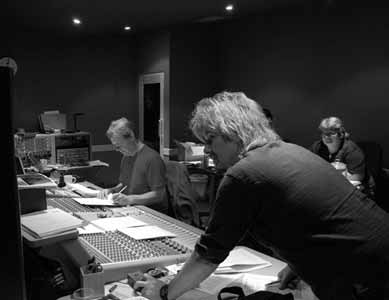 Dirk
Maggs: Dirk Gently's Holistic Detective Agency is an
Above The Title Production being released both on CD and as
a download by BBC Audiobooks, it's not connected with Perfectly
Normal Productions [PNP]. Dirk
Maggs: Dirk Gently's Holistic Detective Agency is an
Above The Title Production being released both on CD and as
a download by BBC Audiobooks, it's not connected with Perfectly
Normal Productions [PNP].
TP:
With author Douglas Adams having trusted your ability to adapt
books three to five of HHGG, it's a logical progression
that his family would want you to tackle the Dirk Gently
books. How did you secure the arrangement?
Not
a question I can answer as I was not privy to the relevant
discussions.
TP:
Had you read these books previously, or did you come to them
cold?
DM:
I read the Dirk Gently books in the '90s and I remember
finding the first one very confusing! I had to keep flipping
back to work out what was going on.
When it came to preparations for this radio series I was working
on other projects whilst the adaptation was in other hands
and was on the back foot when it came to advising on the best
way to proceed. Then it fell into my lap with much left to
do and I had to get up to speed very quickly. If you're dramatising
something this clever you need to really understand it as
if you yourself were the author, and that was the first and
biggest challenge - to spot all of the subtleties and double
bluffs that Douglas built in.
Once I'd worked out what was going on, it seemed to me that
the structure would need some massaging to create six relatively
self-contained episodes which weren't all descriptive narration.
And because we were aiming at a comedy slot the task was to
create something funny and fast moving that made some kind
of sense when it was all over.
TP:
I understand there is to be three series of six episodes each,
but there are only two books. Does this mean there is to be
material used from the published but incomplete novel, The
Salmon of Doubt? If so, are you privy to any of Douglas's
ideas for the missing material? There are rumours that he
was thinking of turning the book into HHGG number six.
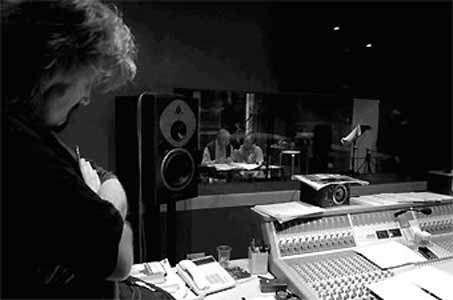 DM:
Douglas's former business partner Robbie Stamp kindly passed
on all the Dirk Gently material that survived on Douglas's
hard drives. This means that we have access to notes and draft
material that was too fragmentary to be much use to the editors
of The Salmon Of Doubt but would be really useful for
building a third radio series. DM:
Douglas's former business partner Robbie Stamp kindly passed
on all the Dirk Gently material that survived on Douglas's
hard drives. This means that we have access to notes and draft
material that was too fragmentary to be much use to the editors
of The Salmon Of Doubt but would be really useful for
building a third radio series.
On
what I have seen so far, a sixth Hitchhikers book it
wasn't, and Douglas was playing with a real mix of ideas,
from metaphysics to slapstick Pythonesque stuff.
TP:
Is the schedule pretty much the same as for your previous
work? How long is it taking to adapt and record six episodes?
DM:
I
can answer that to the minute! Twelve weeks! That was four
weeks writing, two weeks recording, six weeks post-production.
TP: Again, this is a lot of material to commit to script in
a short period of time, but I've noticed from previous projects
that you seem to thrive under pressure. Have the adaptations
gone pretty smoothly or have you come against any unforeseen
problems?
DM:
Finding
time to sit and read the book forensically with a highlighter
and a pencil was the hard part. It's very tempting just to
jump in and start banging out a version of what is written.
But you can't do that if you are adapting to another medium.
You have to keep thinking, "How can we convey this very
static description in a lively funny way? How will this be
rewarding for the listener? How will an actor feel about playing
this role?"
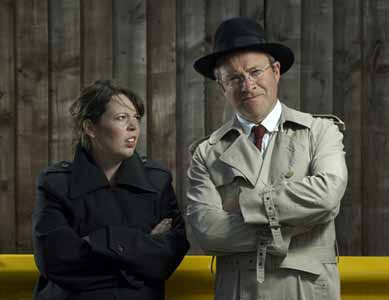 You're
continually asking questions about how this can be made more
interesting and accessible for all concerned. And at the same
time honouring Douglas's work. You're
continually asking questions about how this can be made more
interesting and accessible for all concerned. And at the same
time honouring Douglas's work.
TP: How did you go about selecting the
voice cast? In particular, Harry Enfield is an intriguing
choice to play the main character; was he always at the forefront
of your mind? With reference to his character-based sketch
shows for TV, was there a need to stop his overacting? There
must have been some hilarity in the studio already? Did the
BBC demand a relatively well-known cast?
DM:
Well the voice casting started last year and involved several
people. Lots of ideas were passed around and Harry was one
of them.
He turned out to be the perfect choice, the only problem we
are having now is to dispel preconceptions about him being
all funny voices and larking about. He's a very gifted actor
and the interesting thing was to find the sound of Dirk Gently,
which, after a couple of false starts, turned out to be close
to his natural speaking voice. But then the thing is to forget
it's Harry Enfield and savour the performance. He IS Dirk,
quirky, defensive, smug - if you go in with open ears and
an open mind.
With regard to the BBC, there have been no demands for 'names',
the star of the show is Douglas's genius and the cast were
really happy to let that be the case.
TP: Certain forums recently have been
somewhat unkind about your choice of names for the cast. Do
you worry about pleasing the fans, or is it just a case of
doing what you believe is right and risking not pleasing all
of the people all of the time?
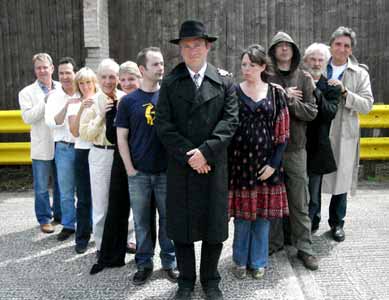 DM:
Look, it's fun to play with dream casting ideas and to kick
ideas around, and it's fun to bitch a little on a forum if
one feels an opportunity has been missed. But the truth is
that in the long gestation period leading up to these recordings
there was nothing left to chance. No opportunity was passed
by that might improve the end result. DM:
Look, it's fun to play with dream casting ideas and to kick
ideas around, and it's fun to bitch a little on a forum if
one feels an opportunity has been missed. But the truth is
that in the long gestation period leading up to these recordings
there was nothing left to chance. No opportunity was passed
by that might improve the end result.
What you hear is sifted over and over, every aspect, from
the choice of adverb in the first line of dialogue to the
right people to play the parts.
Years
ago Douglas and I discussed the choice between doing what
was true to the artistic vision of a project and doing something
that would please the kinds of people who considered they
knew more about his work and what was good for it than he
did.
Douglas
said - and I quote verbatim - "F*ck 'em". In other
words, do what's true to the the vision. The real fans understand
what he meant and how much we work at keeping his vision intact.
TP:
There is an amateur audio version of Dirk Gently currently
available on the Web to listen to. Have you come across it,
and if so what is your opinion?
DM:
I do know of the amateur version and look forward to hearing
it one day when this all over - but not until!
TP: I imagine that these stories offer
less scope for spectacular and striking sound effects than
some of your previous subject matter, such as the comic book
adaptations. How have you approached the sound in these ones
to bring the books to life?
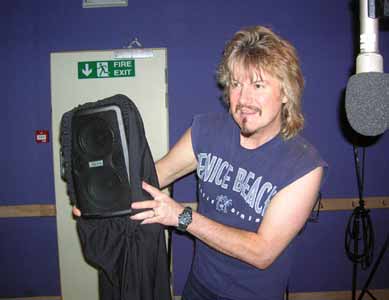 DM:
What
I do is not so much jumping at the chance to use huge one-off
effects as to use sound in layers, creating worlds in which
these characters live. DM:
What
I do is not so much jumping at the chance to use huge one-off
effects as to use sound in layers, creating worlds in which
these characters live.
For example, I spent a long time deciding what backgrounds
you can hear through the windows of Dirk's office - both the
windows of his inner office and of Janice's outer office.
I can take a good hour over which kind of phone ring Susan
Way might choose to cut through the noise of her cello practice
- and how reverberant her flat is. Is it a Victorian conversion
with high ceilings or a modern steel-and-glass apartment full
of hard reflective surfaces?
The detail doesn't diminish in intimate scenes - in fact it
can take longer than blowing up a whole galaxy!
TP:
The
first series of Dirk Gently airs on BBC Radio 4 from
03 October, have dates been confirmed for episodes seven to
eighteen yet?
DM:
As
I understand it Series Two will air Autumn 2008 and Series
Three Autumn 2009.
TP:
I
might be mistaken but this is the first time I've noticed,
in a press release for your work, opportunities for an interview.
Do you think this is because of the popularity of Douglas
Adams, or is the BBC finally beginning to appreciate your
reliability and talent?
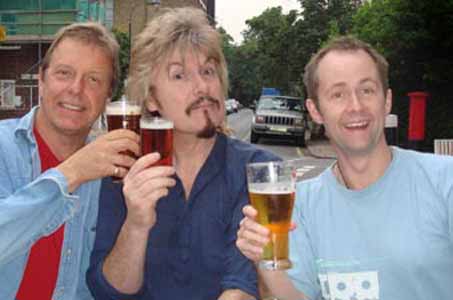 DM:
I
wish I could say it was because of my good looks and scintillating
wit but the bottom line is that Douglas is sadly not here
to talk about the series and, because it's a whole new ball
game, I'm the poor alternative! DM:
I
wish I could say it was because of my good looks and scintillating
wit but the bottom line is that Douglas is sadly not here
to talk about the series and, because it's a whole new ball
game, I'm the poor alternative!
TP: Is there any other Douglas Adams
material around that you might be interested in adapting for
radio at a later date?
DM:
Well given that I had thought I would stop at Hitchhikers,
I think this will probably do me nicely thank you!
TP: Can we look forward to any more
DVD/audio releases like HHGG: The Tertiary Phase? And
what projects can we look forward to in the future from PNP?
DM:
At
present I believe there are no plans to release further HHGG
material in 5.1 surround on DVD.
I'm afraid I've had so much work on that I've not been able
to be involved with Perfectly Normal Productions as much as
I had hoped, and my colleague Paul Weir is carrying that project
forward.
TP:
Thank you for your time.
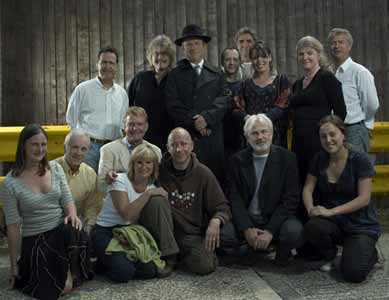
With
thanks to Lee Leschasin at BBC Audio
Dirk
Gently's Holistic Detective Agency begins
broadcasting on Radio 4 from 03 October 2007. It is also available
to buy on CD from BBC
Audio
from 08 November 2007.
Click
here
to buy Dirk Gently's Holistic Detective Agency on CD
for £15.19
Return
to...

|